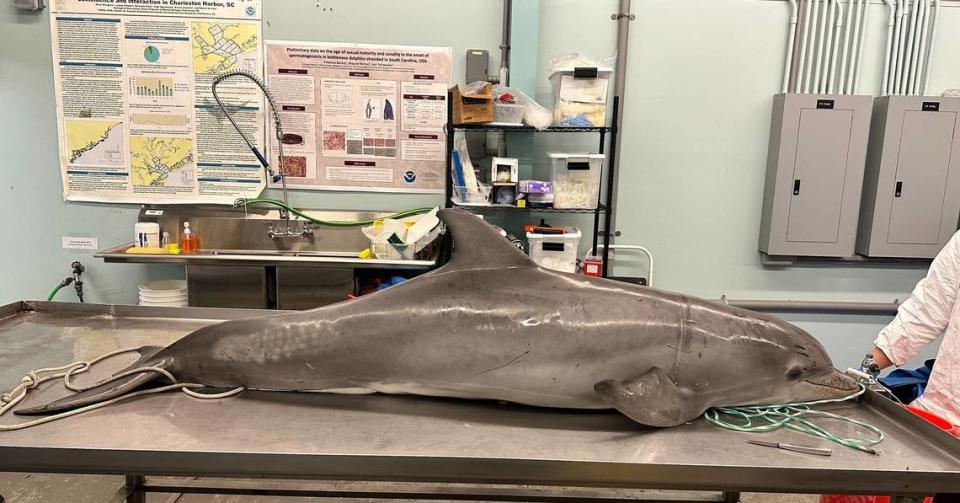Bottlenose dolphin discovered in Port Royal died of unusual cause: Asphyxiation
A bottlenose dolphin recently found dead in Port Royal probably died from a rare deformity that allowed a fish to get lodged in its airway.
“This was a sad situation and an unfortunate passing for this animal,” said Lauren Rust, the state coordinator for the Lowcountry Marine Mammal Network, “but presented a very interesting case for our team.”
The necropsy conducted by the network in Charleston discovered the unusual cause of death.
A fully intact fish was found lodged in its trachea, which likely caused immediate asphyxiation, Rust said.

Dolphins have a cartilaginous flap called a “goose beak,” which keeps the respiratory (trachea) and digestive (esophagus) tracts separate when a dolphin swallows food, Rust said. But this dolphin’s goose beak was deformed allowing the fish to get accidentally lodged in its trachea.
“We think the animal was probably living with it for some time,” Rust told the Beaufort Gazette and Island Packet. “Unfortunately one fish got into the airway.”
The dolphin had 35 fish in its stomach, Rust said, so it was probably feeding shortly before it died.
The deformity could have been a birth defect or been caused by a virus, Rust said.
Although Rust has seen dolphins die after choking on fish that were too large to swallow, this is the first time she’s seen a fatality from a fish getting lodged in an airway.
The dolphin lab at the University of South Carolina Bluffton found the 6.5-foot-long dolphin at the mouth of the Colleton River Dec. 5. It was floating belly up.
Dolphins, Rust said, use area rivers extensively because there is plenty of food and fewer threats. The area has resident and seasonal dolphins that use the rivers in addition to dolphins that are found off the coast.
The dolphin lab, which photographs dolphins, had seen the dolphin twice before in the same area.
The dolphin lab team brought it to the Port Royal Sound Foundation, where it was picked up by the network, which responds to incidents involving dolphins and whales South Carolina.
The network responds to 50 to 60 animal calls per year on the South Carolina coast. Common calls are related to disease such as pneumonia or human impacts such as boat strikes or entanglements with fishing gear, Rust said.
Whom to call
If you come across a stranded or dead whale or dolphin call the Lowcountry Marine Mammal Network at 800-922-5431.


